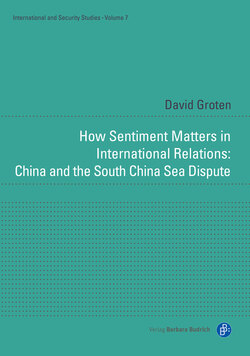Читать книгу How Sentiment Matters in International Relations: China and the South China Sea Dispute - David Groten - Страница 30
На сайте Литреса книга снята с продажи.
2.3.6 Emotional Critique
ОглавлениеClosely related to each of the previous indicators, emotional complaints about the way China feels treated by external actors constitute the fifth respect indicator. Such complaints may differ in degree, ranging from an uncommon wording, given the usually rather pragmatic and diplomatic language adopted in official publications in China, up to fully-fledged outrage and “unproportionate critique” (Wolf, 2008, p. 21). As negative emotions are especially associated with the non-material and non-instrumental dimension of disrespect (disrespect as a sentiment) and are not just mere side-effects83 of disrespect experiences but a possible cause thereof,84 they are devoted an independent indicator. For the sake of this project, emotional complaints are expected to particularly take the shape of anger and frustration, hence affecting the way in which external conduct is perceived. For instance, if anger (let alone resentment) is prevalent, an actor’s threshold determining whether certain conduct is disrespectful or not is expected to be lower than in the absence of such emotions (Dodge et al., 1990; Graham & Hudley, 1994). In total, indicator four is concerned with emotions (limited to the input dimension) aroused by (or preceding) external conduct in the SCS. Its main focus will be placed on emotional critique in reaction to the presumed external misrecognition of China’s status and identity. That said, emotions shall be captured and recognized, on the one hand, by tracing emotional terms and terminology (e.g. aggression, affront, provocation) adopted including strong criticism voiced. On the other hand, the discursive context in which those terms and representations are spotted is to be taken into consideration as well. Moreover, the level of anger and frustration is assumed to be negatively affected if any external conduct is regarded as deliberate or hazarding the consequences, directed against oneself, lacking an excuse or justification, involving third parties, or gaining public attention (Miller, 2001).
